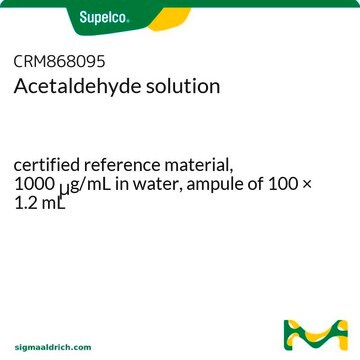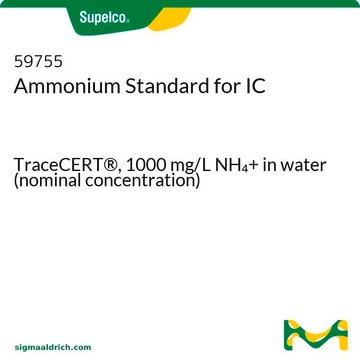506788
Acetaldehyde
PESTANAL®, analytical standard
Synonym(s):
Ethanal
About This Item
Recommended Products
grade
analytical standard
Quality Level
vapor density
1.52 (vs air)
vapor pressure
14.63 psi ( 20 °C)
product line
PESTANAL®
CofA
current certificate can be downloaded
autoignition temp.
365 °F
expl. lim.
60 %
packaging
ampule of 1000 mg
technique(s)
HPLC: suitable
gas chromatography (GC): suitable
refractive index
n20/D 1.332 (lit.)
bp
21 °C (lit.)
mp
−125 °C (lit.)
density
0.785 g/mL at 25 °C (lit.)
application(s)
agriculture
cleaning products
cosmetics
environmental
flavors and fragrances
food and beverages
personal care
format
neat
storage temp.
2-8°C
SMILES string
CC=O
InChI
1S/C2H4O/c1-2-3/h2H,1H3
InChI key
IKHGUXGNUITLKF-UHFFFAOYSA-N
Looking for similar products? Visit Product Comparison Guide
General description
Application
Legal Information
Signal Word
Danger
Hazard Statements
Precautionary Statements
Hazard Classifications
Carc. 1B - Eye Irrit. 2 - Flam. Liq. 1 - Muta. 2 - STOT SE 3
Target Organs
Respiratory system
Storage Class Code
3 - Flammable liquids
WGK
WGK 3
Flash Point(F)
-38.0 °F - closed cup
Flash Point(C)
-38.89 °C - closed cup
Personal Protective Equipment
Choose from one of the most recent versions:
Already Own This Product?
Find documentation for the products that you have recently purchased in the Document Library.
Customers Also Viewed
Protocols
-Tolualdehyde; Valeraldehyde; Isovaleraldehyde
Our team of scientists has experience in all areas of research including Life Science, Material Science, Chemical Synthesis, Chromatography, Analytical and many others.
Contact Technical Service







